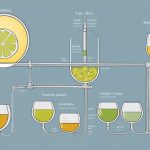Apple juice, a refreshing and sweet beverage enjoyed by many, has always been a staple in my household. But have you ever wondered if apple juice can turn into alcohol without the addition of yeast? Will it ferment on its own? Today, I’ll take a deep dive into this fascinating process and share my personal experiences with you.
First, let’s understand the basic principle behind fermentation. Fermentation is a natural metabolic process where microorganisms, typically yeast, convert sugars into alcohol and carbon dioxide. Yeast consumes the sugars present in the apple juice and produces ethanol (alcohol) as a byproduct.
Typically, when making alcoholic beverages, we add yeast to the juice to kickstart the fermentation process. However, in some cases, wild yeasts naturally present in the environment might be able to ferment the apple juice, although the outcome can be unpredictable.
I decided to conduct an experiment in my own kitchen to see if apple juice could ferment without adding any yeast. I poured some fresh, unfiltered apple juice into a sterilized glass jar and covered it with a cheesecloth to allow for airflow. I placed it in a warm spot away from direct sunlight and waited.
After a couple of days, I noticed tiny air bubbles forming on the surface of the juice, indicating that fermentation was taking place. Slowly, a subtle tangy aroma started to emanate from the jar, further confirming the conversion of sugars into alcohol. While the fermentation was not as vigorous as when using commercial yeast, it was indeed happening.
So, how does this spontaneous fermentation occur? It’s all thanks to the wild yeasts present in the air and on the fruit itself. These yeasts, floating around in the environment, can find their way into the apple juice and initiate the fermentation process. However, it is important to note that the outcome of this natural fermentation can be unpredictable. The flavor profile, alcohol content, and quality of the resulting beverage may vary significantly.
While it is possible for apple juice to ferment without the addition of yeast, I must caution you about the risks involved. Without proper control and understanding of the fermentation process, there is a higher chance of contamination, off-flavors, and potentially harmful microorganisms taking over. This is why commercial production of alcoholic beverages relies on specific strains of yeast that have been selected for their consistency and quality.
In conclusion, while it is fascinating that apple juice can ferment without added yeast, it is recommended to use commercially available yeast strains for reliable and predictable results when creating alcoholic beverages. However, if you’re feeling adventurous and want to experiment with wild fermentation, make sure to do comprehensive research, take necessary precautions, and be prepared for a unique and potentially unpredictable outcome.







